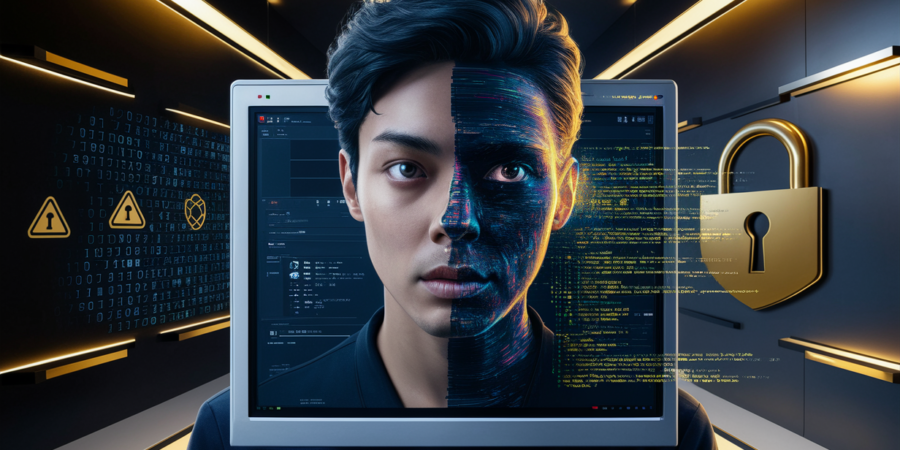Introduction — When Seeing is No Longer Believing
There was a time when we trusted what we saw with our own eyes. But in the digital era, even our eyes can be fooled. With the rise of deepfake technology, it’s becoming harder to tell reality from fabrication. A deepfake can clone your face, mimic your voice, and make you appear to say or do things you never did — all in a matter of minutes.
While AI can be a powerful tool for good, in the wrong hands, it becomes a weapon — one that can destroy reputations, extort money, manipulate elections, and ruin lives. And the scariest part? The victim often doesn’t even know it’s happening until it’s too late.
What Exactly is a Deepfake?
A deepfake is a highly realistic fake video, audio, or image created using Artificial Intelligence, especially deep learning algorithms. It uses a person’s existing photos, videos, or voice recordings to generate new, fake media that looks and sounds authentic.
Hackers and cybercriminals can steal your identity, create fake scandals, impersonate you for fraud, or even use your likeness in inappropriate content — without your consent.
Real-Life Scenarios That Have Shaken the World
- The Bollywood Deepfake Scam — In 2023, a deepfake video of an Indian actress went viral, showing her promoting an investment scam. Within hours, thousands had believed it to be genuine and invested money — losing lakhs. The actress had no idea until fans reached out to her in shock.
- Voice Cloning in Business Fraud — A UK-based company lost $243,000 when scammers used deepfake voice technology to mimic the CEO’s voice and instruct an employee to transfer funds urgently.
- Political Manipulation — During election seasons worldwide, fake speeches and fabricated video clips of political leaders have been used to spread misinformation, provoke public outrage, and influence voter decisions.
- Personal Reputation Damage — An Indian college student’s photos were stolen from her Instagram and turned into explicit deepfake videos that were sent to her family and college peers — pushing her into severe mental distress.
How Do Deepfake Crimes Happen?
- Data Collection: Criminals collect your photos, videos, or audio clips from social media, interviews, Zoom calls, or even CCTV footage.
- AI Processing: They use deep learning tools to train a model on your face and voice patterns.
- Fake Media Creation: They generate fake videos, audios, or images that look and sound convincingly real.
- Distribution: They spread this fake content on social media, news platforms, or send it privately to extort you.
The Dangerous Consequences
- Identity Theft & Fraud — Criminals use your likeness to commit crimes in your name.
- Reputation Damage — Fake scandals can ruin careers, marriages, and friendships.
- Financial Loss — Voice deepfakes can trick businesses into transferring money.
- Emotional & Mental Trauma — Victims often face anxiety, depression, and social isolation.
- Political & Social Manipulation — Fake speeches or videos can mislead entire communities.
How to Protect Yourself From Deepfake Cybercrimes
- Limit Public Sharing: Avoid oversharing videos, selfies, or personal voice recordings online.
- Strengthen Privacy Settings: Keep your social media accounts private and restrict who can view your content.
- Verify Before Trusting: Don’t believe sensational videos without cross-checking with reliable news sources.
- Use Reverse Image Search: If you suspect a fake, use tools like Google Reverse Image Search to trace the source.
- Watermark Your Content: Adding watermarks to your videos and images makes them harder to misuse.
What To Do If You Become a Victim
- Stay Calm, Act Fast: Don’t panic. Take immediate steps to remove the content.
- Document Everything: Save screenshots, links, and timestamps as evidence.
- Report to Platforms: Social media sites like Instagram, YouTube, and Facebook have reporting tools for impersonation or fake content.
- Contact Cybercrime Authorities: In India, you can file a complaint at cybercrime.gov.in.
- Inform Friends & Family: Let them know it’s fake to prevent further damage.
- Seek Legal Help: Cyber laws in India allow you to take action against identity misuse and defamation.
- Consider Professional Reputation Management: PR and cybersecurity firms can help in damage control.
Final Takeaway — Awareness is Your Best Defense
Deepfakes are not just a technological curiosity — they’re a weaponized form of identity theft. They target trust, the very foundation of human relationships and society. The more we know, the better we can defend ourselves.
In today’s digital age, don’t trust blindly, verify everything. Your face, your voice, your identity — they’re all valuable assets. Guard them as fiercely as you would guard your bank account.
Because in a world of deepfakes, the truth needs defenders — and the first one is you.
Visit Cybersense : Website | Instagram | LinkedIn | Facebook

